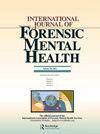Emotionality during and after the Commissions of an Offence: A Look at Offence-Related Shame and Intrusive Memories in Justice-Involved Adult Males
IF 0.9
4区 医学
Q3 CRIMINOLOGY & PENOLOGY
International Journal of Forensic Mental Health
Pub Date : 2020-12-13
DOI:10.1080/14999013.2020.1856978
引用次数: 0
Abstract
Abstract The limited research concerning trauma secondary to committing crime in justice-involved persons has been restricted to male forensic psychiatric and violent offender populations. We aimed to extend this by examining justice-involved persons’ memories about their crimes, and exploring factors involved in intrusive memories across offence types. One hundred justice-involved adult males completed a questionnaire package examining offence-related shame, guilt, instrumentality-reactivity, and memory characteristics. Forty-three percent reported intrusive memories of a crime they committed. These were experienced across all crime types, especially those with reactive elements. Shame was found to be the most significant correlate of intrusive memories over and above all other factors. While further research is needed (e.g., with justice-involved women), results are in line with theoretical foundations of posttraumatic stress disorder and shed light on psychological consequences of offending. The findings have implications for clinicians and researchers alike, in that intrusive memories and shame may be precipitating factors for related risk factors and would relatedly be worth considering when evaluating patterns of violence and creating relapse prevention plans.犯罪时和犯罪后的情绪:涉及正义的成年男性犯罪相关羞耻和侵入性记忆的研究
涉法人员犯罪后继发创伤的研究有限,主要集中在男性法医精神科和暴力犯罪人群。我们的目标是通过研究与司法有关的人对其罪行的记忆,并探索涉及犯罪类型的侵入性记忆的因素,来扩展这一研究。100名与正义有关的成年男性完成了一份调查问卷,调查了与犯罪有关的羞耻感、内疚感、工具性反应和记忆特征。43%的人报告了他们所犯罪行的侵入性记忆。所有类型的犯罪都有这种现象,尤其是那些具有反应性因素的犯罪。研究发现,羞耻感是与侵入性记忆最相关的因素,超过了所有其他因素。虽然需要进一步的研究(例如,涉及司法的妇女),但结果符合创伤后应激障碍的理论基础,并阐明了犯罪的心理后果。这些发现对临床医生和研究人员都有启示意义,因为侵入性记忆和羞耻可能是相关风险因素的诱发因素,在评估暴力模式和制定复发预防计划时值得考虑。
本文章由计算机程序翻译,如有差异,请以英文原文为准。
求助全文
约1分钟内获得全文
求助全文

 求助内容:
求助内容: 应助结果提醒方式:
应助结果提醒方式:


